ATHENE WRATH
Greek Name
Αθηνη
Transliteration
Athênê
Latin Spelling
Athena
Translation
Minerva
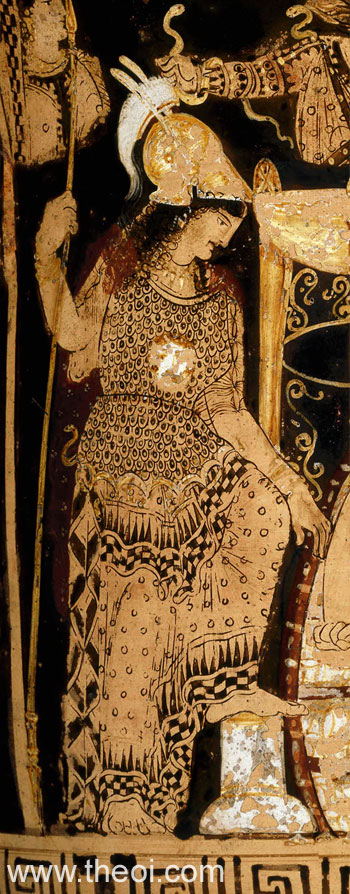
ATHENA was the Olympian goddess of wisdom, war, heroism and crafts.
This page contains tales of the goddess' wrath which was, for the most part, directed at those who had violated the sanctity of her shrines. The most famous of these stories include the curiosity of the Kekropides (Cecropides), the transformation and beheading of the Gorgon Medousa, and the shipwreck of Aias Oileïs (Oilean Ajax).
(1) WRATH SACRILEGE
AGRAULOS (Agraulus) A princess of Athens (southern Greece) who opened the secret box containing the infant Erikhthonios against the express orders of Athena, and proceeded to slander the virgin goddess. In anger, Athena caused the girl to become inflamed with jealousy over the wooing of her sister by the god Hermes. When she tried to obstruct him, he transformed Agraulos into a stone.
AIAS OÏLEUS (Oilean Ajax) A prince of Opuntian Lokris (central Greece) who raped the Trojan princess Kassandra within the goddess' holy precincts at the fall of Troy. To avenge herself upon Aias and the Greeks, who failed to punish him, Athena sent a storm to devastate their fleet. Aias was shipwrecked and drowned, while his people, the (historical) Opuntians, were compelled to appease the goddess for 1000 years with the despatch of sacrificial maidens to the Trojan land. [See Athena & the Trojan War: Shipwreck of Ajax]
AUGE A princess of Arkadia (southern Greece) and a priestess of Athena, who birthed her illegitimate son within the sacred precincts of the goddess. As punishment for the sacriligeous act, Athena made the land barren until the king had the girl exiled and sold into slavery.
"CROW" A bird familiar of Athena, who angered the goddess either by revealing the secret of the baby Erikhthonios to the daughters of Kekrops, or by reporting to her as an overly keen tell-tale that the girls had opened the secret chest. In either case the goddess punished him by turning his white feathers to black and banishing him from her company.
IODAMA A priestess of Athena in Koroneia, Boiotia (central Greece) who was turned to stone when the goddess appeared before her wearing the Gorgoneion (Medousa's head) displayed upon her breast. Presumably the girl was so punished for some religious sacrilege.
ILOS (Ilus) The first king of Troy (Asia Minor) who was blinded by Athena when he removed the Palladium from the burning shrine of the goddess. It was forbidden for a man to gaze upon the image.
ISMENE A princess of Thebes in Boiotia (central Greece) who had intercourse with her lover in the sacred precinct of Athena. The goddess urged the hero Tydeus to slay her for this infraction.
KEKROPS, DAUGHTERS OF (Cecrops' Daughters) Three princesses of Athens (southern Greece)--named Aglauros, Herse and Pandrosos--who were entrusted by Athena with a chest containing her foster-son, the infant Erikhthonios. She forbade them to open it, but they were overcome by curiousity and did so anyway. As punishment for the sacrilege she drove them mad and they leapt to their deaths from the heights of the Akropolis.
LOKROI (Locrians) The people of Opuntian Lokris (central Greece) were struck down by a deadly plague sent by Athena, as punishment for the desicration of her Trojan temple by their king Aias. An oracle declared that they must thenceforth despatch two maidens to Troy regularly for a thousand years in order to appease the goddess.
MEDOUSA (Medusa) A beautiful nymph who Athena transformed into a hideous monster with serpents for hair. Some say it was because she had intercourse with Poseidon in the goddess' sacred precints, others that she had claimed to be more beautiful than the goddess. Athena also later assisted the hero Perseus in his quest to bring back the Gorgon's head.
TEIRESIAS (Tiresias) A seer of Thebes in Boiotia (central Greece) who accidentally came across the goddess Athena bathing in a mountain stream. As punishment for seeing her naked she took away his sight, but in recompense also bestowed him with gifts, since his crime was not a deliberate one.
(2) WRATH HUBRISTIC BOASTS
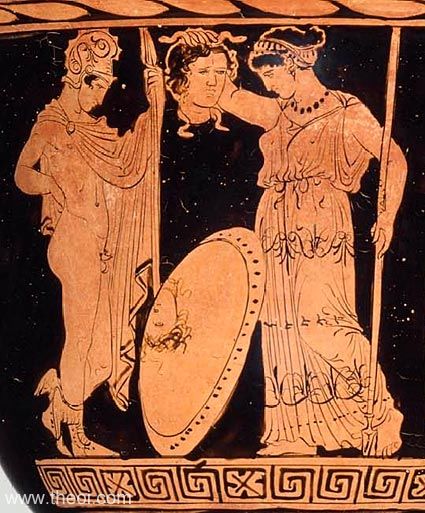
ARAKHNE (Arachne) A girl of Kolophon in Lydia (Asia Minor) who in her hubris dared challenge the weaving goddess to a contest of skill. She lost, and as punishment for her sacriligeous boasts and offensive portrayal of the gods in her art was transformed into a spider.
MEROPIS A princess of the island of Kos (Greek Aegean) who Athena transformed into an owl as punishment for despising the gods and mocking the goddess for her grey eyes.
(3) WRATH PATRON GODDESS
ALKINOE (Alcinoe) A princess of Korinthos (southern Greece) who was cursed by Athena into betraying her own husband as punishment for refusing to pay a spinner named Nikandra the wages which were her due.
(4) WRATH OTHER
AIAS TELAMANIOS (Telamonian Ajax) A prince of the island of Salamis (southern Greece) who fought in the Trojan War. When he lost the contest for the Arms of Akhilleus to Odysseus, Athena drove him to madness when he threatened to slay some of the Greek leaders. [See Athena & the Trojan War: Madness of Ajax]
HARMONIA A queen of Thebes in Boiotia (central Greece) who, at her weddding to King Kadmos was presented with a cursed necklace and robe by the gods Athena and Hephaistos. The two divinities cursed her as punishment for her mother Aphrodite's immoral behaviour: for Harmonia was the child born of the goddess' adulterous affair with Ares.
LAOKOON (Laocoon) A priest of Poseidon at Troy (Asia Minor). When he would reveal the secret of the Trojan Horse to his comrades, Athena sent two giant serpents forth from the sea to destroy him and his sons. [See Athena & the Trojan War: Death of Laocoon]
TEUTHIS A prince of Arkadia (southern Greece) who in the course a quarrel with Agamemnon at Aulis, wounded Athena in the thigh with a spear. Teuthis was sent home, and the goddess then afflicted his people with a wasting disease until she was properly appeased.
CLASSICAL LITERATURE QUOTES
ATHENA WRATH : THE CECROPIDES & THE CROW
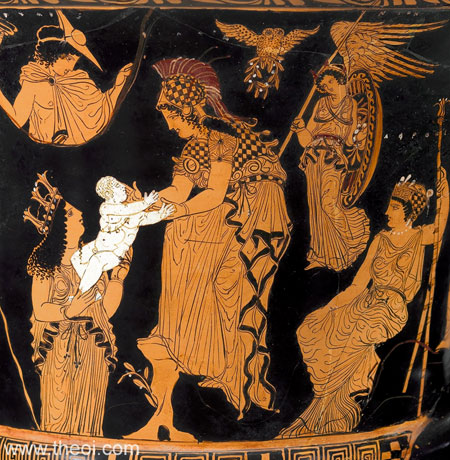
LOCALE : Athens, Attika (Southern Greece)
For the PRELUDE to this story see Athena & the Birth of Erichthonius
VERSION 1
Pseudo-Apollodorus, Bibliotheca 3. 14. 6 (trans. Frazer) (Greek mythographer C2nd A.D.) :
"Athena brought him [Erikhthonios] up unknown to the other gods, wishing to make him immortal; and having put him in a chest, she committed it to Pandrosos, daughter of Kekrops, forbidding her to open the chest. But the sisters of Pandrosos opened it out of curiosity, and beheld a serpent coiled about the babe; and, as some say, they were destroyed by the serpent, but according to others they were driven mad by reason of the anger of Athena and threw themselves down from the acropolis."
Callimachus, Hecale Fragment 1.2 (from Papyri) (trans. Trypanis) (Greek poet C3rd B.C.) :
"Pallas laid him [Erikhthonios], the ancient seed of Hephaistos within the chest, until she set a rock in Akte (attika) for the sons of Kekrops; a birth mysterious and secret, whose lineage I neither knew nor learnt, but they themselves [the daughters of Kekrops] declared, according to report among the primeval birds [the crows], that Gaia (earth) bare him to Hephaistos. Then she [Athena], that she might lay a bulwark [the Akropolis] for the land which she had newly obtained by vote of Zeus and the twelve other immortals and the witness of the Snake [Kekrops], came unto Pellene in Akhaia [to fetch the rock]. Meanwhile the maidens that watched the chest bethought them to do an evil deed ((lacuna)) . . and undoing the fastings of the chest . . [rest of papyrus text missing]."
Callimachus, Hecale Fragment 1.3 (from Papyri) :
"We crows alone are rejected of the gods: for never did I vex they heart, O Lady [Athena] . . ((lacuna)) but I would that I had been voiceless then [i.e. reavealing the secret of Erikhthonios]. So much she abhors our voice and suffers not our race to call upon her name. Mayst thou never fall from her favour: ever grievous is the anger of Athene."
Pausanias, Description of Greece 1. 18. 2 (trans. Jones) (Greek travelogue C2nd A.D.) :
"It was to Aglauros and her sisters, Herse and Pandrosos, that they say Athena gave Erikhthonios, whom she had hidden in a chest, forbidding them to pry curiously into what was entrusted to their charge. Pandrosos, they say, obeyed, but the other two (for they opened the chest) went mad when they saw Erikhthonios, and threw themselves down the steepest part of the Akropolis."
Pseudo-Hyginus, Fabulae 166 (trans. Grant) (Roman mythographer C2nd A.D.) :
"When Minerva [Athena] was secretly caring for him [the infant Erikhthonios], she gave him in a chest to Aglaurus, Pandrosus, and Herse, daughters of Cecrops, to guard. A crow gave the secret away when the girls opened the chest, and they, driven made by Minerva [Athena], threw themselves into the sea."
Suidas s.v. Drakaulos (trans. Suda On Line) (Byzantine Greek lexicon C10th A.D.) :
"Drakaulos : Sophokles in Tympanistai uses the word. Since Athena seems to place the snake among them, for the daughters of Kekrops. Because they dwell in the same courtyard, as you would expect, as Kekrops, who is of double nature. Because one of them, spending the day with the goddess, dwells on the Akropolis with the Drakon."
VERSION 2
Ovid, Metamorphoses 2. 550 ff (trans. Melville) (Roman epic C1st B.C. to C1st A.D.) :
"To learn the latest news a garrulous Crow flapped quickly after him [Apollon's Raven], and when it heard his journey's aim, ‘To no good end,’ it said, ‘You make your way. Heed my prophetic tongue! See what I was, what I am now, and ask did I deserve it. Frank good faith you'll find was my undoing. Once upon a time a baby, Erichthonius, was born without a mother. Pallas [Athena] hid the child safe in a box of wicker wood and gave the box to Cecrops' three unmarried daughters, with strict instructions not to pry inside. I hid among the delicate foliage of a large leafy elm and watched to see what they would do. Two, Pandrosos and Herse, impeccably observed their trust; but one, Aglauros, called them cowards and untied the fastenings, and there inside they saw the baby, and beside him stretched a Draco (Snake). I told the goddess. All the thanks I got was to be banished from Minerva's [Athenas] sight, reduced to rank below the bird of night [the owl]! My punishment might well warn birds to watch their tongues and take no risks. No doubt you think I pestered her, and not that she chose me: asks Pallas then herself! Of course she's angry, but not too angry to admit the truth . . . I [the crow] was given to Minerva [Athena], her companion without stain. But what good was it, if Nyctimene, she who was made a bird [the owl] for her foul sin, supplants me in my place of privilege?’"
Ovid, Metamorphoses 2. 748 ff :
"She [Agraulos] looked at him [the god Hermes when he had come to woe her sister Herse] with those hard eyes that spied not long ago fair-haired Minerva's [Athena's] mystery [i.e. the baby Erikhthonios], and asked a golden fortune for her services, and pending payment forced him from the house. The warrior goddess [Athena] turned her angry eyes upon the girl and heaved a sigh so deep that breast and aegis shuddered. She recalled it was Aglauros whose profaning hand laid bare that secret when the oath she swore was broken [i.e. opening the forbidden box] and she [Aglauros] saw the infant boy [Erikhthonios], great Lemnicola's [Hephaistos'] child, the babe no mother bore; and now she would find favour with the god and with her sister too, and grow so rich with all that gold her greed had planned to gain. Straighway she [Athena] sought the filthy slimy shack were Invidia (Envy) dwelt [and summoned her to lay her curse upon the girl] . . . Tritonia [Athena] filled with loathing, forced a few curt words : ‘Inject your pestilence in one of Cecrops' daughters; that I need; Aglauros is the one.’ . . .
Into the room of Cecrops' child she [Invidia] went and did as she was bid. On the girl's breast she laid her withering hand [and infected her with jealous heart] . . . She sat herself outside her sister's door to bar Cyllenius' [Hermes'] access [but was turned by the angry god into a stone]."
ATHENA WRATH : MEDUSA
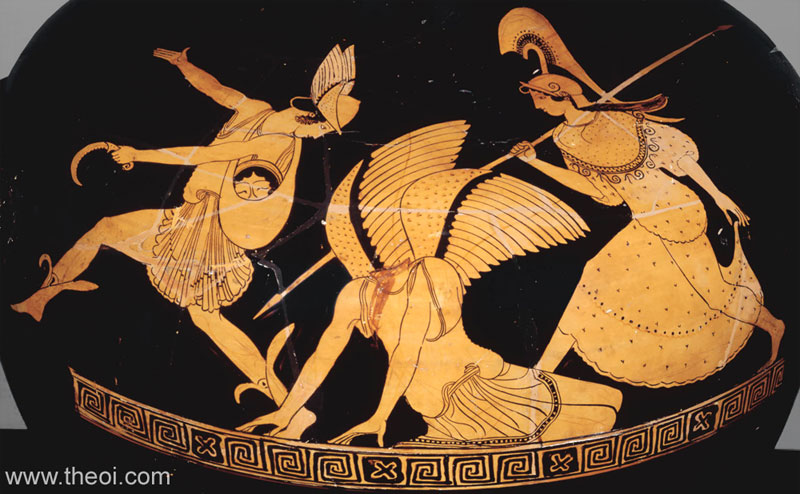
LOCALE : Kisthene Island (perhaps in the Red Sea)
I. METAMORPHOSIS
Ovid, Metamorphoses 4. 790 ff (trans. Melville) (Roman epic C1st B.C. to C1st A.D.) :
"Her [Medousa's] beauty was far-famed, the jealous hope of many a suitor, and of all her charms her hair was loveliest; so I was told by one who claimed to have seen her. She, it's said, was violated in Minerva's [Athena's] shrine by the Lord of the Sea (Rector Pelagi) [Poseidon]. Jove's [Zeus'] daughter [Athena] turned away and covered with her shield her virgin's eyes. And then for fitting punishment transformed the Gorgo's lovely hair to loathsome snakes. Minerva [Athena] still, to strike her foes with dread, upon her breastplate wears the snakes she made."
II. BEHEADING
Pseudo-Apollodorus, Bibliotheca 2. 46 (trans. Aldrich) (Greek mythographer C2nd A.D.) :
"It is affirmed by some that Medousa was beheaded because of Athena, for they say the Gorgon had been willing to be compared with Athena in beauty."
Pseudo-Apollodorus, Bibliotheca 2. 37-41 :
"Perseus took flight and made his way to the ocean, where he found the Gorgones sleeping . . . All who looked at them were turned to stone. Perseus, therefore, with Athena guiding his hand, kept his eyes on the reflection in a bronze shield as he stood over the sleeping Gorgones, and when he saw the image of Medousa, he beheaded her."
For MORE information on the Gorgon see MEDOUSA
ATHENA WRATH : AUGE
LOCALE : Tegea, Arkadia (Southern Greece)
For the PRELUDE to this story see Athena Favour: Heracles' Spartan War
Pseudo-Apollodorus, Bibliotheca 2. 146 (trans. Aldrich) (Greek mythographer C2nd A.D.) :
"On his way past Tegea Herakles deflowered Auge, without realizing that she was the daughter of Aleus [his wartime ally]. She gave birth to her child secretly and placed it in the temenos of Athena. Since the land was being ravished by a pestilence [sent by the goddess], Aleus entered the temenos and there tracked down the evidence of his daughter's travail. He set the infant out for exposure on Mount Parthenon . . . and gave Auge to Poseidon's son Nauplios to sell abroad [into slavery]."
ATHENA WRATH : ARACHNE
LOCALE : Kolophon, Lydia (Anatolia)
Ovid, Metamorphoses 6. 1 ff (trans. Melville) (Roman epic C1st B.C. to C1st A.D.) :
"Then to herself [Athena said]--‘To praise is not enough; I should have praise myself, not suffer my divinity to be despised unscathed.’ She had in mind Arachne's doom, the girl of Lydia, who in the arts of wool-craft claimed renown (so she had heard) to rival hers. The girl had no distinction in her place of birth or pedigree, only that special skill. Her father was Idmon Colophonius, whose trade it was to dye the thirsty wool with purple of Phocaea. She had lost her mother, but she too had been low-born and matched her husband. Yet in all the towns of Lydia Arachne's work had won a memorable name, although her home was humble and Hypaepae where she lived was humble too. To watch her wondrous work the Nymphae would often leave their vine-clad slopes of Tmolus, often leave Pactolus' stream, delighted both to see the cloth she wove and watch her working too; such grace she had. Forming the raw wool first into a ball, or fingering the flock and drawing out again and yet again the fleecy cloud in long soft threads, or twirling with her thumb, her dainty thumb, the slender spindle, or embroidering the pattern--you would know Pallas [Athena] had trained her.
Yet the girl denied it [all such gifts were god-given so her denial was blasphemous], a teacher so distinguished hurt her pride, and said, ‘Let her contend with me. Should I lose, there's no forfeit that I would not pay.’ Pallas [Athena] disguised herself as an old woman, a fringe of false grey hair around her brow, her tottering steps supported by a stick, and speaking to the girl, ‘Not everything that old age brings,’ she said, ‘we'd wish to avoid. With riper years we gain experience. Heed my advice. Among the world of men seek for your wool-craft all the fame you will, but yield the goddess place, and humbly ask pardon for those rash words of yours; she'll give you pardon if you ask.’
With blazing eyes Arachne stared at her and left her work. She almost struck her; anger strong and clear glowed as she gave the goddess (in disguise) her answer : ‘You're too old, your brain has gone. You've lived too long, your years have done for you. Talk to your daughters, talk to your sons' wives! My own advice is all I need. Don't think your words have any weight. My mind's unchanged. Why doesn't Pallas come herself? Why should she hesitate to match herself with me?’ Then Pallas said, ‘She's come!’ and threw aside the old crone's guise and stood revealed.
The Nymphae and Lydian women knelt in reverence. Only Arachne had no fear. Yet she blushed all the same, a sudden colour tinged her cheeks against her will, then disappeared; so when Aurora [Eos] rises in the dawn, the eastern sky is red and, as the sun climbs, in a little while is pale again. She stood by her resolve, setting her heart, her stupid heart, on victory, and rushed to meet her fate. Nor did the child of Jove [Zeus] refuse or warn her further or postpone the contest. Then, with no delay, they both, standing apart, set up their separate looms and stretched the slender warp. The warp is tied to the wide cross-beam; a cane divides the threads; the pointed shuttles carry the woof through, sped by their fingers. When its through the warp, the comb's teeth, tapping, press it into place. Both work in haste, their dresses girdled tight below their breasts; the movements of their arms are skilled and sure; their zeal beguiles their toil. Here purple threads that Tyrian vats have dyed are woven in, and subtle delicate tints that change insensibly from shade to shade. So when the sunshine strikes a shower of rain, the bow's huge arc will paint the whole wide sky, and countless different colours shine, yet each gradation dupes the gaze, the tints that touch so similar, the extremes so far distinct. Threads too of golden wire were woven in, and on the loom an ancient tale was traced [Athena depicted her contest with Poseidon for Athens] . . .
Yet to provide examples to instruct her rival what reward she should expect for her insensate daring, she designed in each of the four corners four small scenes of contest, brightly coloured miniatures . . . That was the end, and she finished her picture with her own fair tree.
Maeonis [Arakhne] shows [in her weaving the seduction of various mortals by gods in animal disguise] . . . Round the edge a narrow band of flowers she designed, flowers and clinging ivy intertwined.
In all that work of hers Pallas could find, envy could find, no fault. Incensed at such success the warrior goddess, golden-haired, tore up the tapestry, those crimes of heaven, and with the boxwood shuttle in her hand (box of citrus) three times, four times, struck Arachne on her forehead. The poor wretch, unable to endure it, bravely placed a noose around her neck; but, as she hung, Pallas in pity raised her. ‘Live!’ she said, ‘Yes, live but hang, you wicked girl, and know you'll rue the future too: that penalty your kin shall pay to all posterity!’ And as she turned to go, she sprinkled her with drugs of Hecate, and in a trice, touched by the bitter lotion, all her hair falls off and with it go her nose and ears. Her head shrinks tiny; her whole body's small; instead of legs slim fingers line her sides. The rest is belly; yet from that she sends a fine-spun thread and, as a spider, still weaving her web, pursues her former skill. All Lydia rang; the story raced abroad through Phrygia's towns and filled the world with talk."
Virgil, Georgics 4. 246 ff (trans. Fairclough) (Roman bucolic C1st B.C.) :
"The spider, hateful to Minerva [Athena], hangs in the doorway her loose-woven nets."
ATHENA WRATH : HARMONIA
LOCALE : Thebes, Boiotia (Central Greece)
Pseudo-Hyginus, Fabulae 148 (trans. Grant) (Roman mythographer C2nd A.D.) :
"From their [Aphrodite and Ares' adulterous] embrace Harmonia was born, and to her Minerva [Athena] and Vulcanus [Hephaistos] gave a robe ‘dipped in crimes’ as a gift. Because of this, their descendants are clearly marked as ill-fated."
ATHENA WRATH : TEUTHIS
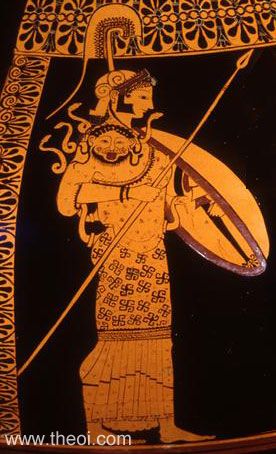
LOCALE : Aulis, Boiotia (Central Greece) & Teuthis, Arkadia (Southern Greece)
Pausanias, Description of Greece 8. 28. 5-6 (trans. Jones) (Greek travelogue C2nd A.D.) :
"Adjoining the land of Theisoa is a village called Teuthis [in Arkadia], which in old days was a town. In the Trojan war the inhabitants supplied a general of their own. His name according to some was Teuthis, according to others Ornytos. When the Greeks failed to secure favorable winds to take them from Aulis, but were shut in for a long time by a violent gale, Teuthis quarrelled with Agamemnon and was about to lead the Arkadians under his command back home again. Whereupon, they say, Athena in the guise of Melas, the son of Ops, tried to turn Teuthis aside from his journey home. But Teuthis, his wrath swelling within him, struck with his spear the thigh of the goddess, and actually did lead his army back from Aulis. On his return to his native land the goddess appeared to him in a vision with a wound in her thigh. After this a wasting disease fell on Teuthis, and its people, alone of the Arkadians, suffered from famine. Later, oracles were delivered to them from Dodona, telling them what to do to appease the goddess, and in particular they had an image of Athena made with a wound in the thigh. This image I have myself seen, with its thigh swathed in a purple bandage."
ATHENA WRATH : ILUS
LOCALE : Troy, the Troad (Anatolia)
Pseudo-Plutarch, Greek and Roman Parallel Stories 17 (trans. Babbitt) (Greek historian C2nd A.D.) :
"When the shrine of Athena in Ilion was in flames, Ilos [the first king of Troy] rushed up and seized the Palladion, a statue which had fallen from heaven, and was blinded: for the Palladion might not be looked upon by man. But later, when he had placated the goddess, he regained his sight. So says Derkyllos in the first book of his Foundations of Cities."
For other MYTHS of the Palladium see:
(1) Childhood of Athena & Friend Pallas
(2) Athena & the Trojan War: Theft of the Palladium
ATHENA WRATH : THE LOCRIANS
LOCALE : Opountian Lokris (Central Greece) & Troy, the Troad (Anatolia)
For the PRELUDE to this story see Athena & the Trojan War: Shipwreck of Ajax
Pseudo-Apollodorus, Bibliotheca E6. 20-22 (trans. Aldrich) (Greek mythographer C2nd A.D.) :
"Lokrian Aias, when he saw Kassandra clinging to the wooden statue of Athena, raped her . . . Athena was enraged at . . . the impious act of Aias [and destroyed his ship] . . . The [rest of Aias'] Lokrians regained their own country with difficulty [after returning from the Trojan War], and three years afterwards, when Lokris was visited by a plague, they received an oracle bidding them to propitiate Athena at Ilion [Troy] and to send two maidens as suppliants for a thousand years. The lot first fell on Periboia and Kleopatra. And when they came to Troy they were chased by the natives and took refuge in the sanctuary. And they did not approach the goddess, but swept and sprinkled the sanctuary; and they did not go out of the temple, and their hair was cropped, and they wore single garments and no shoes. And when the first maidens died, they sent others; and they entered into the city by night, lest, being seen outside the precinct, they should be put to the sword; but afterwards they sent babes with their nurses. And when the thousand years were passed, after the Phokian war they ceased to send suppliants."
Callimachus, Aetia Fragment 1. 8 (from Scholiast on Iliad 13. 66) (trans. Trypanis) (Greek poet C3rd B.C.) :
"Athena compelled the Lokrians for a space of a thousand years to send to Ilios maidens selected by lot. The story in Callimachus Aitia 1."
Callimachus, Aetia Fragment 2.1 (from Scholiast on Lycophron 1141) :
"A plague having come on Lokris through the assault of Aias upon Kassandra, the god [Apollon] told them by an oracle that for a thousand years they must send maidens every year to Troy for Athena. When they arrived they were slain by the Trojans who met and stoned them. Any who escaped made their way secretly to the temple of Athena and became for the future her priestesses."
Strabo, Geography 13. 1. 40 (trans. Jones) (Greek geographer C1st B.C. to C1st A.D.) :
"The present Ilians [Trojans] further tell us that the city was, in fact, not completely wiped out at its capture by the Akhaians and that it was never even deserted. At any rate the Lokrian maidens, beginning a little later, were sent every year. But this too is non-Homeric, for Homeros knows not of the violation of Kassandra . . . and yet he does not so much as mention any violation of her or say that the destruction of Aias in the shipwreck took place because of the wrath of Athena or any such cause . . . But the fact is that the Lokrian maidens were first sent when the Persians were already in power."
Other sources not quoted here: Tzetzes on Lycrophon; Polybius xii.5; Scholiast on Homer's Iliad xiii.66; Iamblichus, De Pythagorica vita, viii.42; Suidas, s.v. poinê; Servius on Virgil's Aeneid 1.41
ATHENA WRATH : IODAMA
LOCALE : Koroneia, Phokis (Central Greece)
Pausanias, Description of Greece 9. 34. 1 (trans. Jones) (Greek travelogue C2nd A.D.) :
"Iodama, who served the goddess [Athena] as priestess [at the shrine of Koroneia in Phokis], entered the precinct by night, where there appeared to her Athena, upon whose tunic was worked the head of Medousa the Gorgon. When Iodama saw it, she was turned to stone. For this reason a woman puts fire every day on the altar of Iodama, and as she does this she thrice repeats in the Boiotian dialect that Iodama is living and asking for fire."
ATHENA WRATH : ALCINOE
LOCALE : Korinthos (Southern Greece)
Parthenius, Love Romances 27 (trans. Gaselee) (Greek poet C1st B.C.) :
"From the Curses of Moero [of Byzantium, Greek poetess C3rd B.C.]: Alkinoe, so the story goes, was the daughter of Polybos of Korinthos and the wife of Amphilokhos the son of Dryas; by the wrath of Athene she became infatuated with a stranger from Samos, named Xanthos. This was the reason of her visitation: she had hired a woman named Nikandra to come and spin for her, but after she had worked for her for a year, she turned her out of her house without paying her the full wages she had promised, and Nikandra had earnestly prayed Athene to avenge her for the unjust withholding of her due. Thus afflicted, Alkinoe reached such a state that she left her home and the little children she had borne to Amphilokhos, and sailed away with Xanthos; but in the middle of the voyage she came to realise what she had done. She straightway shed many tears, calling often, now upon her young husband and now upon her children, and though Xanthos did his best to comfort her, saying that he would make her his wife, she would not listen to him, but threw herself into the sea."
SOURCES
GREEK
- Apollodorus, The Library - Greek Mythography C2nd A.D.
- Callimachus, Hymns - Greek Poetry C3rd B.C.
- Callimachus, Fragments - Greek Poetry C3rd B.C.
- Parthenius, Love Romances - Greek Mythography C1st B.C.
- Strabo, Geography - Greek Geography C1st B.C. - C1st A.D.
- Pausanias, Description of Greece - Greek Travelogue C2nd A.D.
- Plutarch, Parallel Stories - Greek Historian C1st - 2nd A.D.
ROMAN
- Hyginus, Fabulae - Latin Mythography C2nd A.D.
- Ovid, Metamorphoses - Latin Epic C1st B.C. - C1st A.D.
- Virgil, Georgics - Latin Bucolic C1st B.C.
BYZANTINE
- Suidas, The Suda - Byzantine Greek Lexicon C10th A.D.
BIBLIOGRAPHY
A complete bibliography of the translations quoted on this page.